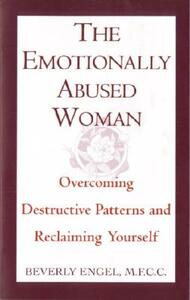Take a photo of a barcode or cover
7 reviews for:
The Emotionally Abused Woman: Overcoming Destructive Patterns and Reclaiming Yourself
Beverly Engel
7 reviews for:
The Emotionally Abused Woman: Overcoming Destructive Patterns and Reclaiming Yourself
Beverly Engel
I debated on whether I would share that I was reading this book because I didn't want people to make assumptions about my marriage and yadda yadda yadda. However, I don't think there should be any stigma around being a victim of abuse or mental health. I have PTSD from childhood abuse and it is really hard to find really good, but simple resources. My therapist recommended this book because I have found myself in a lot of relational patterns that I simply couldn't figure out as an adult from work settings to basic friendships. This book divides abusers and those who are abused into different archetypes to help people identify their behaviors and then gives many different examples. I honestly cannot tell you how many people I have recommended this book to since I first picked it up; it has been very eye opening to see how many people have these very issues in their lives. I highly recommend this book if you have a loved one who has been abused (which I assure you, you know someone), if you have been abused, or if you're trying to figure out why your relationships feel out of whack.
I didn't enjoy this one. Some really weird takes e.g. lesbians feel worthless and empty so they're obsessed with their significant others? just what exactly in the "Psycho Lesbian" trope...? The author actually explicitly states she doesn't believe abuse is the victim's fault, but the whole book is written with victim-blaming language, suggesting either this isn't fully accurate, or it's not written as well/appropriately as it could have been.
Tough truths that are much needed at this point in my life. Aiding walking me through certain things and great points for confirmation and moving forward.
If you are reading this book and looking for healing from childhood abuse you have to take your time and not breeze through it. I have read many self-help books from this category over the past five years and this one is a great resource to have in your library. Beverly leaves no stone unturned and for such a short page count there are many gems. There have been many not so good reviews about victim blaming and her section on deciding to stay and I feel that she puts the responsibility on the reader to take charge of their own healing instead of trying to figure out why you were treated a certain way by certain people or waiting for someone to save you from being alone. I think this is valid coaching for someone on a healing journey who has survived this specific form of abuse. Sometimes we can get too caught up in the why instead of the what now? How do I want to start having my needs met? Also due to financial issues some women do decide to stay in situations that are unhealthy indefinitely and I don’t feel that she made it appealing to stay at all but was presenting truths of that reality that so many womxn face on a daily basis. Of course leaving and cutting ties is ultimately healthier but abuse also gets worse as one is leaving the situation too. This book seems to be targeted more for people who have come from dysfunctional early familial foundations focusing on how that affects one’s life as an adult and speaks of overt abuse rather than covert abuse. It took me a long time to complete the book because so many sections hit so deep. This book is helping me with a writing project of my own about maternal transgenerational trauma and I am so grateful it called to me. I wish that there was an updated edition that could speak about #MeToo movement and how that also impacts our society in terms of emotional abuse of womxn. Overall it was a good book and one should read in tandem with therapy and other supports.
challenging
emotional
hopeful
informative
inspiring
reflective
slow-paced
The various questions and excersizes for self reflection were thought provoking. A lot of material to unpack.
I really like this book for healing from narcissistic abuse. You could easily read it in a weekend.
Overall, the book was alright, but in most of her work, Beverly Engel is really into victim-blaming and focusing on how the person being abused "chose" to be in the situation, or how they attracted their abusers, which I think is kind of the worst thing to do when someone is freshly experiencing emotional abuse. I highly recommend reading "Why Does He Do That?: Inside the Minds of Angry and Controlling Men" by Lundy Bancroft instead.



